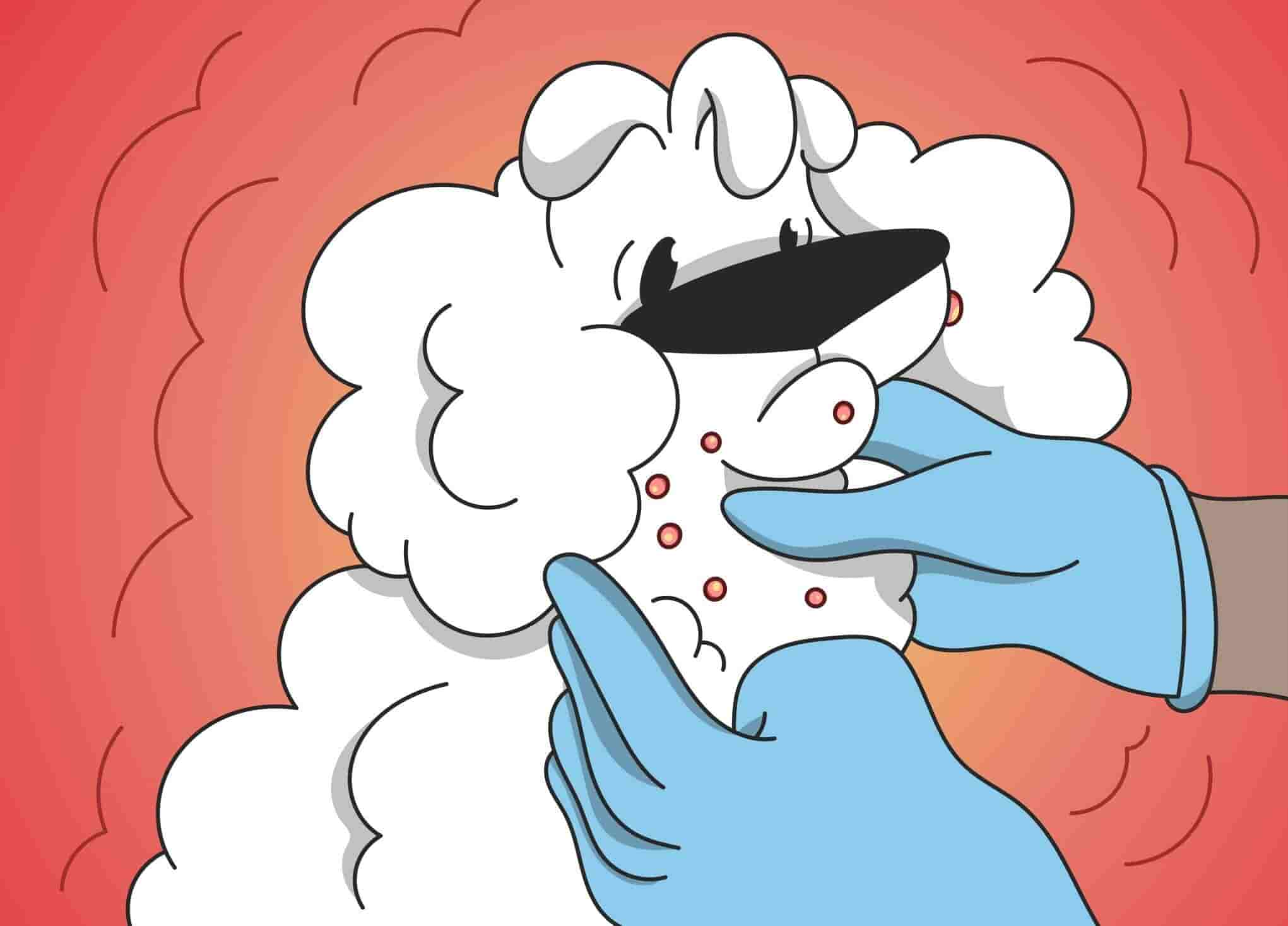We, humans, and our dog companions may be of different species, but we are similar in many ways.
Let's talk about hair and skin for example. We know that dogs' bodies are covered with fur. On the other hand, we humans also have hair around our bodies, but to a lesser extent. In relation to this, we may wonder if dogs experience skin issues like us. Can dogs get pimples the way humans do? Let's unwrap this question!
This article was reviewed by our expert veterinarian, Chris Vanderhoof (DMV).
Can dogs get pimples?
While it may not be as obvious nor expected because they are covered in fur, dogs can get pimples too. Having said this, you might be wondering, what is dog acne and how does it differ from human acne?
Dog acne
According to research, pimples in dogs are considered an inflammatory skin condition. Veterinarians are often able to diagnose this just by looking at the appearance of your dog's skin.
In some cases, additional tests may be recommended to confirm the diagnosis and rule out other possible conditions such as skin allergies.
Akin to hair follicles in humans, dog fur also contains sebaceous glands, the purpose of which is to produce sebum that protects their fur while building skin resiliency.
When fur follicles become congested, the sebum that is produced isn't excreted the normal way. Sebum accumulates in the gland and this may form swelling that results in dog acne.
What do dog pimples look like?
Dog acne is described as the formation of reddish bumps or pimples, usually characterized by the appearance of skin lesions around the muzzle and lips, commonly identified in this condition. The fur follicle may happen to become damaged and break, causing inflammation.
Dog acne may also be due to excess oil, bacteria, and dead skin cells. If this goes untreated, there's a possibility for it to result in infection. Severe cases may cause bleeding, swelling, scabbing, and even permanent scars.
Why dogs get pimples
The usual area where dogs get pimples are around the muzzle and lips. Other common locations include the genital area, belly, and chest.
One might think that the causes of acne are just the same as in humans. However, it may be surprising to learn that there are other causes that are more prevalent in the canine species.
Dog breed
There are certain dog breeds that are more prone to getting pimples, mainly due to the fact that these dog breeds have shorter coats and particular skin features that are more susceptible to pimples.
Among some of these breeds are: English bulldogs, Great Danes, Rottweilers, Boxers, German Shorthaired Pointers, Mexican hairless, and Chinese crested.
Dirt & debris
Elements such as dirt and debris may cause irritation that leads to a dog pimple breakout. In addition to this, if you notice that your dog has acne on their chin or muzzle area, and if the breakouts happen repeatedly, try to find what may be causing it.
One reason may be due to the food or water bowls that you feed them with. Plastic bowls have been known to cause irritation in some dogs when used for feeding.
If you've already changed their bowls to non-plastic alternatives yet they are still having breakouts, watch out for behaviors such as scratching on their muzzles, and rubbing their muzzles in soil or other rough surfaces. In addition to exposing follicles to dirt and debris, it may also cause trauma to the follicles.
Dog acne treatment
Normal canine acne can usually be treated with a topical product. You can consult with your veterinarian as to which one they would recommend for your dog.
Read more: What To Expect From An Online Vet Visit
In some cases, your vet may want to treat your dog's acne with something more than a topical product. This usually happens in cases when your dog's skin is itchy, painful, swelling, or seems to have an infection.
Depending on the situation, your vet may prescribe medications in addition to a topical product. These may include medicated shampoos, antibiotics (topical or oral), or steroids.
Home remedies and preventative measures
Observe and address
If you notice your dog repeatedly getting pimples in the same area, try to find out what is causing it, and alter your dog's routine to prevent it from happening again.
Regular skin care routine
For dogs who have frequent skin care issues, a regular skin care routine may help ease and prevent breakouts in the future. It's best to consult with your vet regarding this and discuss what would be best for your dog.
Treatments may include changing their diet or supplements, using a special shampoo, or adopting a skin care regimen for your dog.
No popping
Like with us humans, popping the pimple is not recommended. Popping it may cause further trauma and inflammation and will make it more susceptible to pain, infections, as well as scars.
Online Vet & Emergency Fund
In addressing your dog's overall health, including dog acne, services such as online vets and emergency funds can be of great help.
For example, Petcube's Online Vet service allows pet parents to consult with certified vets, anytime anywhere. Whether it's a minor inquiry such as prevention measures or if you want to consult with a licensed vet regarding your dog's severe and frequent case of acne, Online Vet provides access to unlimited chats and calls with certified vets, whenever and wherever you are.
On the other hand, an Emergency Fund provides coverage of $3000 in all emergency cases and can cover up to 6 pets, while also giving you access to 24/7 online vet consultations.
FAQ
Are pimples and mange the same?
No. Pimples in dogs are due to inflammation in the lips or skin which begins as folliculitis whereas mange in dogs is caused by molecular mites that are infesting the skin.
Does hormonal change cause dog acne?
Hormonal change is a common cause of breakouts in humans, but this isn't the case with our furry companions (although it can contribute in certain conditions). When it comes to dog acne, the more common causes are mentioned above.
Can I use my own skin care products to treat my dog's acne?
No, unless consulted with your vet. Many skincare products that are available on the market may be effective in treating pimples in humans, but may not be ideal for pets.
Depending on the ingredients, there are products that may cause irritation in dogs or may contain ingredients that are toxic to your furry companion when ingested. Because of this, it is important to check with your vet first before using any skin care product on your dog.

Was this article helpful?
Help us make our articles even better









